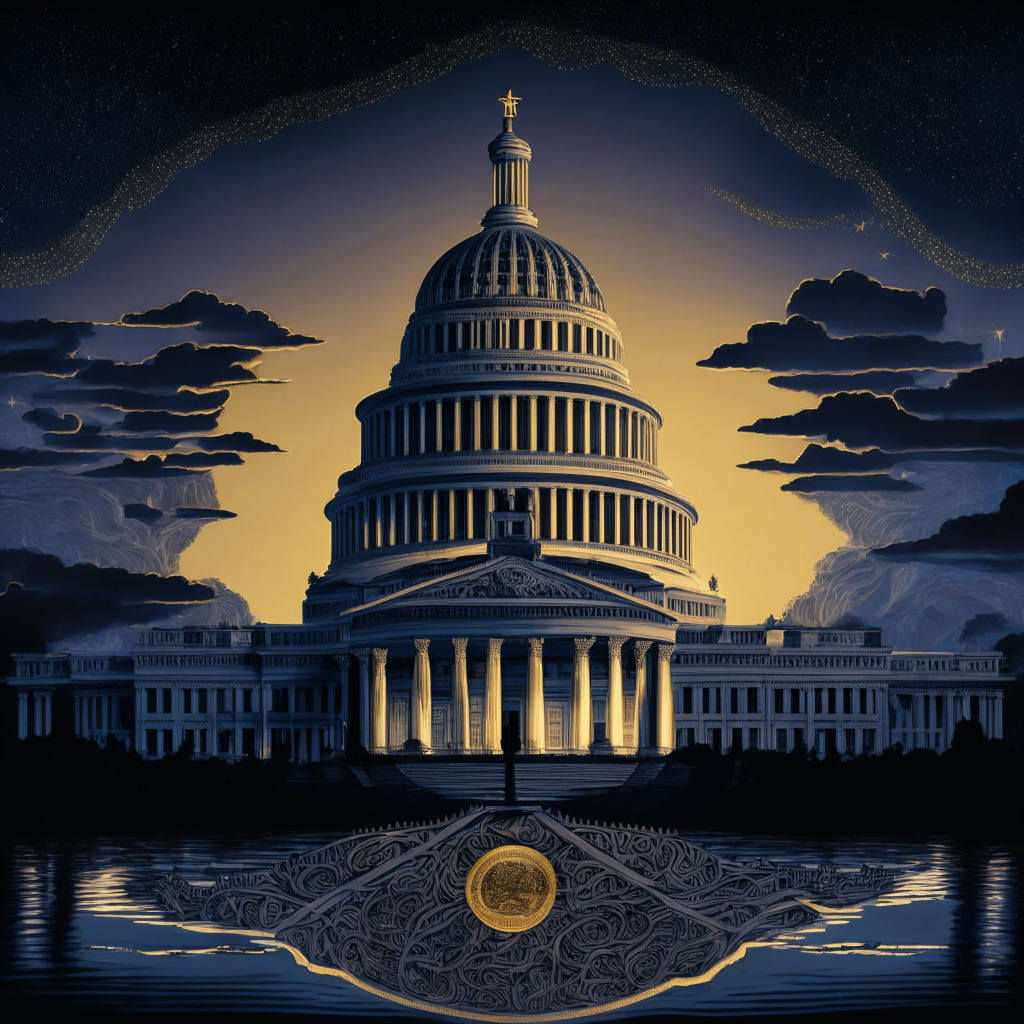The US Department of Justice (DoJ) reportedly deliberates on fraud charges against Binance, one of the world’s largest crypto exchanges. A potential indictment could cause an exodus from Binance, triggering losses and a broader market panic. Authorities are considering fines and deferred prosecution agreements to minimize consumer harm. Binance prepares for potential fallouts by securing assets and maintaining a healthy ratio for mass withdrawals. The incident highlights complexities in the world of cryptocurrencies, with watchful scrutiny on the looming regulatory battle.
Search Results for: U.S
Binance’s Potential U.S. Exit: A Catalyst for Crypto Regulatory Clarity?
“Binance, the crypto exchange platform, is considering shutting its US operations amid intensified regulatory scrutiny and allegations of operating as an unregistered securities exchange. This decision is potentially significant for future crypto adoption, regulatory compliance, and the ongoing institutionalization of cryptocurrencies.”
Navigating Uncertainty: Progress and Hurdles in the U.S. Crypto Regulation Landscape
“Crypto enthusiasts are celebrating progress toward a new U.S. oversight system for digital assets despite uncertainties. The development involves digital assets legislation addressing regulation framework, stablecoins, and crypto-related money laundering. The law guiding crypto operations leaped over two House committees, indicating progress in U.S. crypto regulation.”
U.S. Crypto Regulation: Balancing Innovation and Compliance in the Blockchain Era
“The U.S Congress moved closer to regulatory clarity with two crypto-related bills: the Financial Innovation and Technology for the 21st Century Act, aimed at crypto company registrations, and the Blockchain Regulatory Certainty Act, aiming to cut down barriers for blockchain developers. However, potential conflicts between lawmakers and industry operators may lead to strenuous compliance requirements, possibly bringing the crypto industry closer to traditional finance rules and limitations.”
Cryptocurrency: The Supremacy Race Between U.S and China in the Blockchain Era
In the current era of technological renaissance, the U.S. struggles to keep up with blockchain technology, while China continues to make significant progress with its central bank digital currency. Binance, reportedly handling a majority of global crypto trading volume, faces legal challenges in the U.S. amidst a larger climate of legal obscurity in the crypto industry.
Future BTC Fluctuations: Optimism or Caution Amid Declining U.S Inflation?
“Despite potentially favourable market conditions, Bitcoin’s price action only registered a slight boost. Reputed analysts suggest U.S inflation is under control, contributing to crypto market stability. However, Bitcoin’s volatility remains unaffected, stuck within the range of $29,000 to $29,500. Various successful traders predict a likely downturn. Hence, investors must make judicious decisions, understanding the associated risks.”
U.S. Senate Tightens Crypto Regulations in NDAA 2024: A Necessity or Threat to Blockchain Freedom?
The U.S. Senate’s passage of the 2024 National Defense Authorization Act introduces tighter regulations for financial institutions engaged in crypto trading, marking a significant legislative shift. The bill targets crypto mixers and “anonymity-enhancing” crypto assets and aims to strengthen compliance with money laundering and sanctions laws.
Deciphering the Complex Dance: Bitcoin’s Future and the Robust U.S Economy
“The U.S economy’s robust performance has sparked interest in Bitcoin amidst financial stability in traditional markets. Bitcoin’s value remains hard to predict. However, technical analysis suggests the digital currency could see continued bullish trends, provided it can maintain key supports. Still, market volatility and unpredictable factors render personal research crucial.”
Navigating Crypto Legislation: Can the New U.S Federal Regulatory Framework Provide Clarity?
“The Financial Innovation Technology for the 21st Century Act, aimed at establishing a federal regulatory framework for cryptocurrency, has been forwarded to the full House of Representatives. This addresses the current industry confusion caused by a lack of explicit regulations, by providing clarified guidelines for crypto ventures.”
Twitter Handle Takeover Dispute & The Fight for U.S. Crypto Legislation Clarity
“In a recent turn of events, Twitter handle @X was reportedly confiscated and offered to the user as merchandise and a visit to the company after Elon Musk announced a rebranding under the banner ‘X’. Meanwhile, Coinbase CEO has implored US citizens to cast a ‘yes’ vote for the FIT21 Act, fostering innovation and providing regulatory clarity for crypto firms.”
Sweeping U.S. Regulatory Acts: Crypto Advancement or Investor Risk?
The House Financial Services Committee approves a bipartisan bill, Financial Innovation and Technology for the 21st Century Act, aiming to provide regulatory clarity for cryptocurrencies. The Act delineates registration requirements for crypto firms and seeks to define if a cryptocurrency is a security or a commodity, extending the CFTC’s control over the crypto industry.
Bitcoin Surfs Above $29,000 Amid U.S. Monetary Shift: Musk’s DOGE, Market Outlooks, and Inflation Fears
Despite the U.S. Federal Reserve’s impending hawkish shift, BTC maintains support above $29,000, while most other cryptos face a gloomy market. DOGE uniquely rose 8%, potentially due to rumors of wider crypto usage in Elon Musk’s new Twitter platform, X.
Binance’s Audacious Stand Against U.S. CFTC: A Game-Changer for Crypto Regulations
“Cryptocurrency exchange, Binance, plans to challenge the U.S. Commodity Futures Trading Commission’s lawsuit against it over alleged illegal activities. This audacious move may change the landscape of cryptocurrency regulation within the U.S., setting precedent for future cases and influencing the future of cryptocurrency market.”
Navigating the Pros and Cons of the U.S. House Republicans’ New Crypto Oversight Bill
“The Financial Innovation and Technology for the 21st Century Act by U.S. House Republicans aims to provide a sound regulatory framework for crypto investors protection. The bill seeks to establish clear regulatory principles balancing progressive tech with protective legislation, which, if successful, may streamline the fragmented regulation landscape in the U.S. and serve as a global blueprint.”
Decoding FedNow: U.S Federal Reserve’s Stand on CBDCs and Future of Instant Payment Services
The U.S. Federal Reserve’s new instant payment service, FedNow, set to launch in July 2023, is not associated with central bank digital currencies (CBDCs), but operates within the fiat ecosystem. Despite testing by numerous institutions and growing CBDC interest globally, the Federal Reserve reiterates, it requires legislative authorization before issuing a CBDC.
Roadmap to Regulations: Unveiling the U.S. Senators’ Bill for Comprehensive Crypto Laws
U.S. Senators Cynthia Lummis and Kirsten Gillibrand unveiled a revised draft for comprehensive crypto regulation, marking an evolution from a previous draft penned a year ago. The bill addresses decentralized finance definition, anti-money laundering provisions, custody rules and grants the CFTC decisive control over crypto issuers, alongside defining roles for the SEC.
Bitcoin’s Battle Against Interest Rate Hikes: A Test of Endurance in U.S.’ Growing Economy
“Bitcoin struggles amid the release of U.S. economic data affirming continued growth, and prospect of another interest rate hike by the Federal Reserve. Despite lacklustre retail sales, a deeper look into consumer spending shows optimism. Questions arise regarding Bitcoin’s ability to withstand another Fed rate hike.”
Legal Limbo: Examining the Ripple Case and its Impact on U.S. Cryptocurrency Regulation
Recently, judge Analisa Torres delivered a split decision in SEC v. Ripple Labs, implying legal ambiguity surrounding cryptocurrency tokens. She supported Ripple’s sales of tokens on asset exchanges while contesting institutional sales. This inconsistency leads to uncertainty in the crypto market, which can only be addressed by Congress stepping in to establish standardized regulations.
Bollinger Bands Indicate a Pivotal Moment for Bitcoin Amidst U.S. Inflation Data Release
The ‘Bollinger Band squeeze’ pattern exhibited by Bitcoin is stirring interest amongst crypto traders, as it often forebodes major market shifts. This pattern coincides with the upcoming release of June’s U.S. inflation data, which could significantly impact Bitcoin’s market dynamics.
U.S. Spot Bitcoin ETF: Regulatory Milestone or Investor Attraction Dampener?
“The U.S. SEC’s potential approval of a spot bitcoin ETF may not significantly influence crypto markets, according to investment banking giant JPMorgan. Their report suggests the lack of interest in similar ETFs in Europe and Canada implies that even though a spot bitcoin ETF offers a streamlined, secure cryptocurrency investment method, it fails to attract widespread investor attention.”
U.S Bitcoin Mining Stocks’ Remarkable Comeback: Resilience Amidst Harsh Crypto Winter
Bitcoin mining stocks in the U.S have witnessed a remarkable recovery in 2023, fueled by the strong performance of Bitcoin and institutional exchange-traded-fund (ETF) filings by financial giants. Additionally, resilient miners with minimal costs have profited when Bitcoin prices surpass production costs. However, high-debt miners struggle in this harsh landscape.
Bitcoin Plunges to $30,600: Unexpected U.S. Employment Data Shakes Financial Markets
The value of Bitcoin plunged to $30,600 following surprising US employment data indicating 497,000 private-sector jobs added in June. This resulted in significant financial market fluctuations, with speculation of further Federal Reserve rate hikes affecting crypto and stock markets negatively.
Bitcoin’s Rally: U.S. Institutional Influence and the Regulatory Tightrope
Bitcoin has seen a significant rally as U.S. institutional activity surges. Financial giants like BlackRock, Fidelity, and Citadel have substantially invested in Bitcoin, driving increased trading volumes and price gains. Despite regulatory concerns around other cryptos, Bitcoin’s popularity endures, suggesting a crucial ‘generational moment’ for sustained, long-term institutional adoption.
U.S. Crypto Industry: A Bitcoin-Focused Future Amid Regulatory Shifts
Michael Saylor believes the US crypto industry is poised for a “Bitcoin-focused” future due to regulatory enforcement actions. He claims that regulatory clarity will drive Bitcoin adoption by eliminating confusion and anxiety for institutional investors and predicts Bitcoin’s long-term dominance rising above 80% of the total crypto market.
U.S. Congressional Hearing Explores Blockchain’s Future and Web3 Applications
In a recent House Energy and Commerce Committee Subcommittee meeting, Polygon Labs’ Ryan Wyatt discussed the potential of blockchain technology in creating a decentralized, transparent Web3, benefiting users and driving economic growth. He emphasized the need for a well-regulated blockchain ecosystem in the US to maintain competitiveness and ensure domestic technology industry thrives.
Bitcoin Stagnates vs BRC-20 Tokens Surge: U.S. Treasury Replenishment’s Impact on Crypto
The crypto market is in an accumulation phase, with Bitcoin below $27K and BRC-20 tokens nearing a $500 million market cap. The U.S. Treasury replenishment process and the future of BRC-20 tokens play significant roles in market development. Investors anticipate Ether’s growth and Litecoin’s halving event.
Securities Clarity Act: Resolving Legal Questions and Shaping Crypto’s Future in the U.S.
The Securities Clarity Act, a newly introduced bill, aims to clarify that digital assets in “investment contracts” won’t be considered securities. If passed, it could resolve a heavily debated legal question and make it harder for the SEC to claim that various tokens are unregistered securities.
Debt Ceiling Negotiations: Predicting Bitcoin’s Fate Amid U.S. Economic Climate Shifts
As U.S. debt ceiling negotiations progress, Bitcoin and Ether maintain stability amidst uncertainty. Dave Weisberger, CEO of CoinRoutes, outlines three potential scenarios impacting crypto markets tied to debt ceiling outcomes. Meanwhile, Blend acquires 82% of NFT lending market share, and Nvidia’s stock soars by 25% due to its GPUs’ value in crypto mining and AI applications.
U.S. Crypto Regulation: Balancing Innovation and Public Safety to Ensure Global Leadership
The U.S. Chamber of Digital Commerce is urging Congress to prioritize a national approach to crypto regulation, warning that the lack of proper legal frameworks may result in the nation falling behind in the rapidly evolving blockchain space. Implementation of a unified strategy could bolster U.S. leadership, promote innovation, and address potential risks.
U.S. States Battle Over CBDCs: Privacy Fears, Rising Tension, and a Divided Future
Florida recently banned central bank digital currencies (CBDCs), sparking interest from states such as Louisiana, Alabama, Texas, and North Dakota who also drafted opposition bills. Privacy concerns, government control, and individual freedom are key factors contributing to the contentious debate on CBDCs in the US.
Poloniex Pays Millions in U.S. Treasury Settlement: Costly Compliance Lesson for Crypto Exchanges
In a recent development, cryptocurrency exchange Poloniex has agreed to pay a hefty sum of […]
Debate Booms as BRICS Bloc Explores Single Currency: U.S. Dollar’s Dominance at Stake?
The BRICS bloc, comprising of Brazil, Russia, India, China, and South Africa, is exploring the […]































